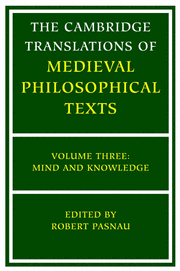Book contents
- Frontmatter
- Contents
- Acknowledgments
- General Introduction
- 1 ANONYMOUS (Arts Master c. 1225) The Soul and Its Powers
- 2 ANONYMOUS (Arts Master c. 1270) Questions on De anima I–II
- 3 BONAVENTURE Christ Our One Teacher
- 4 HENRY OF GHENT Can a Human Being Know Anything?
- 5 HENRY OF GHENT Can a Human Being Know Anything without Divine Illumination?
- 6 PETER JOHN OLIVI The Mental Word
- 7 WILLIAM ALNWICK Intelligible Being
- 8 PETER AUREOL Intuition, Abstraction, and Demonstrative Knowledge
- 9 WILLIAM OCKHAM Apparent Being
- 10 WILLIAM CRATHORN On the Possibility of Infallible Knowledge
- 11 ROBERT HOLCOT Can God Know More than He Knows?
- 12 ADAM WODEHAM The Objects of Knowledge
- Textual Emendations
- Bibliography
- Index
4 - HENRY OF GHENT Can a Human Being Know Anything?
Published online by Cambridge University Press: 23 December 2009
- Frontmatter
- Contents
- Acknowledgments
- General Introduction
- 1 ANONYMOUS (Arts Master c. 1225) The Soul and Its Powers
- 2 ANONYMOUS (Arts Master c. 1270) Questions on De anima I–II
- 3 BONAVENTURE Christ Our One Teacher
- 4 HENRY OF GHENT Can a Human Being Know Anything?
- 5 HENRY OF GHENT Can a Human Being Know Anything without Divine Illumination?
- 6 PETER JOHN OLIVI The Mental Word
- 7 WILLIAM ALNWICK Intelligible Being
- 8 PETER AUREOL Intuition, Abstraction, and Demonstrative Knowledge
- 9 WILLIAM OCKHAM Apparent Being
- 10 WILLIAM CRATHORN On the Possibility of Infallible Knowledge
- 11 ROBERT HOLCOT Can God Know More than He Knows?
- 12 ADAM WODEHAM The Objects of Knowledge
- Textual Emendations
- Bibliography
- Index
Summary
Introduction
Henry of Ghent (c. 1217–1293)was an immensely influential and respected theologian at the University of Paris. Unlike every other theologian represented in this volume, Henry was an independent (or secular) cleric, neither a Franciscan nor a Dominican. His two major works are his Summa quaestionum ordinariarum and his Quodlibeta, both massive collections of questions written and debated over the same extended period of time, from the mid-1270s until his death. Active in formulating the notorious Condemnation of 1277, Henry was in general a conservative voice in Paris, resistant to the growing Aristotelianism of his day, sympathetic to the Augustinianism of Bonaventure.
But Henry was no dull reactionary. He begins his Summa with an extended treatment of the scope and limits of human knowledge, which occupies the first thirty-nine questions of the first five articles. After Henry it became standard to begin theological treatises with this sort of epistemological inquiry, but at the time his approach was unprecedented. Even more startling, Henry begins the very first question, translated here, with a detailed discussion of the merits of skepticism. This was entirely novel territory in the thirteenth century: Though the arguments of the skeptics had a prominent place in the writings of Augustine, earlier scholastics seem nevertheless to have regarded the issue as closed and settled, not worthy even of serious discussion. In reopening these issues, and positioning them so prominently, Henry can be seen as a precursor to the increasingly skeptical tone of much fourteenth-century philosophy (see, for instance, Translation 10) – even though his intention is to refute skepticism soundly.
This and the following selection present the first two questions from the first article of Henry's Summa.
- Type
- Chapter
- Information
- The Cambridge Translations of Medieval Philosophical Texts , pp. 93 - 108Publisher: Cambridge University PressPrint publication year: 2002



